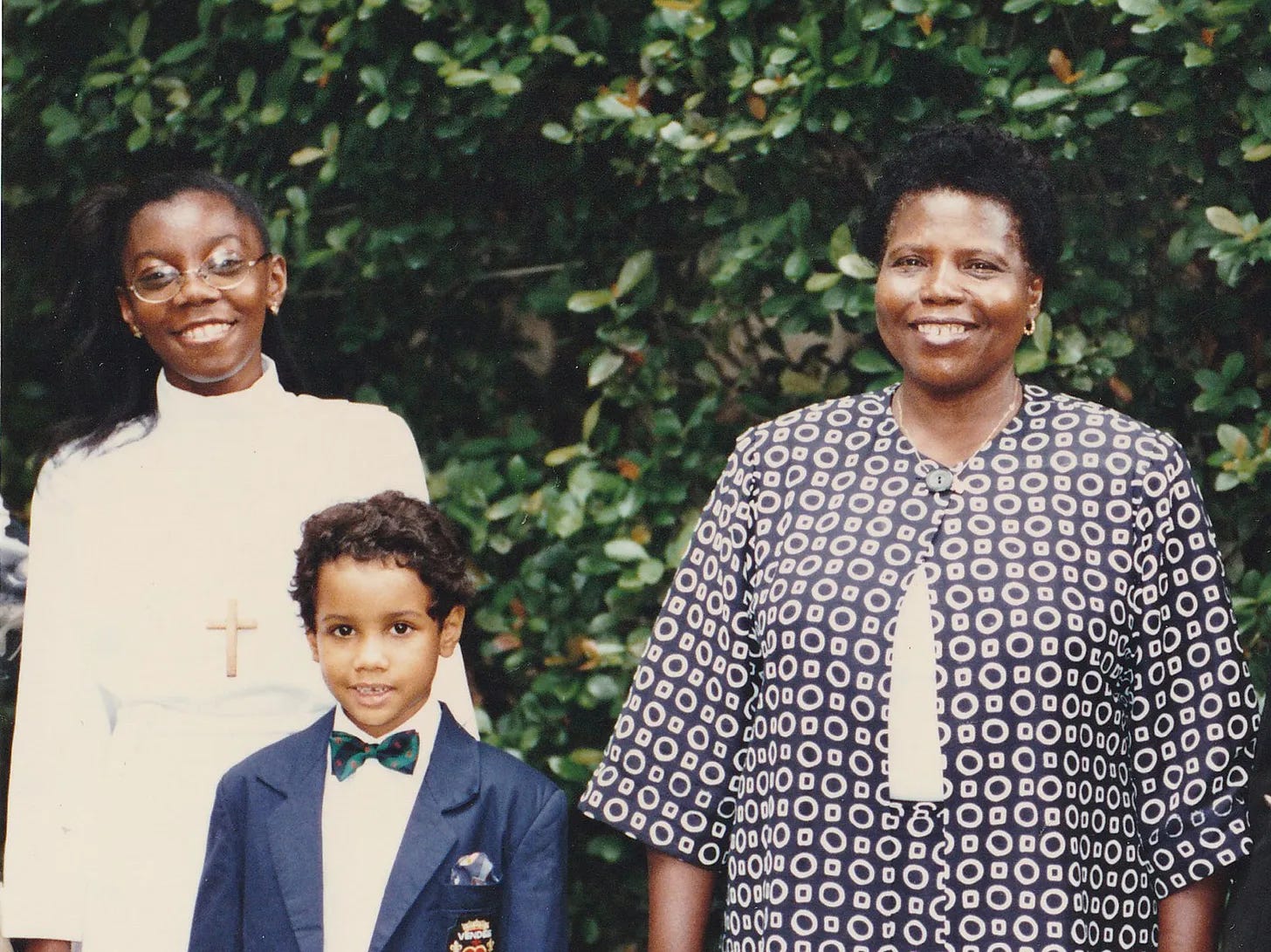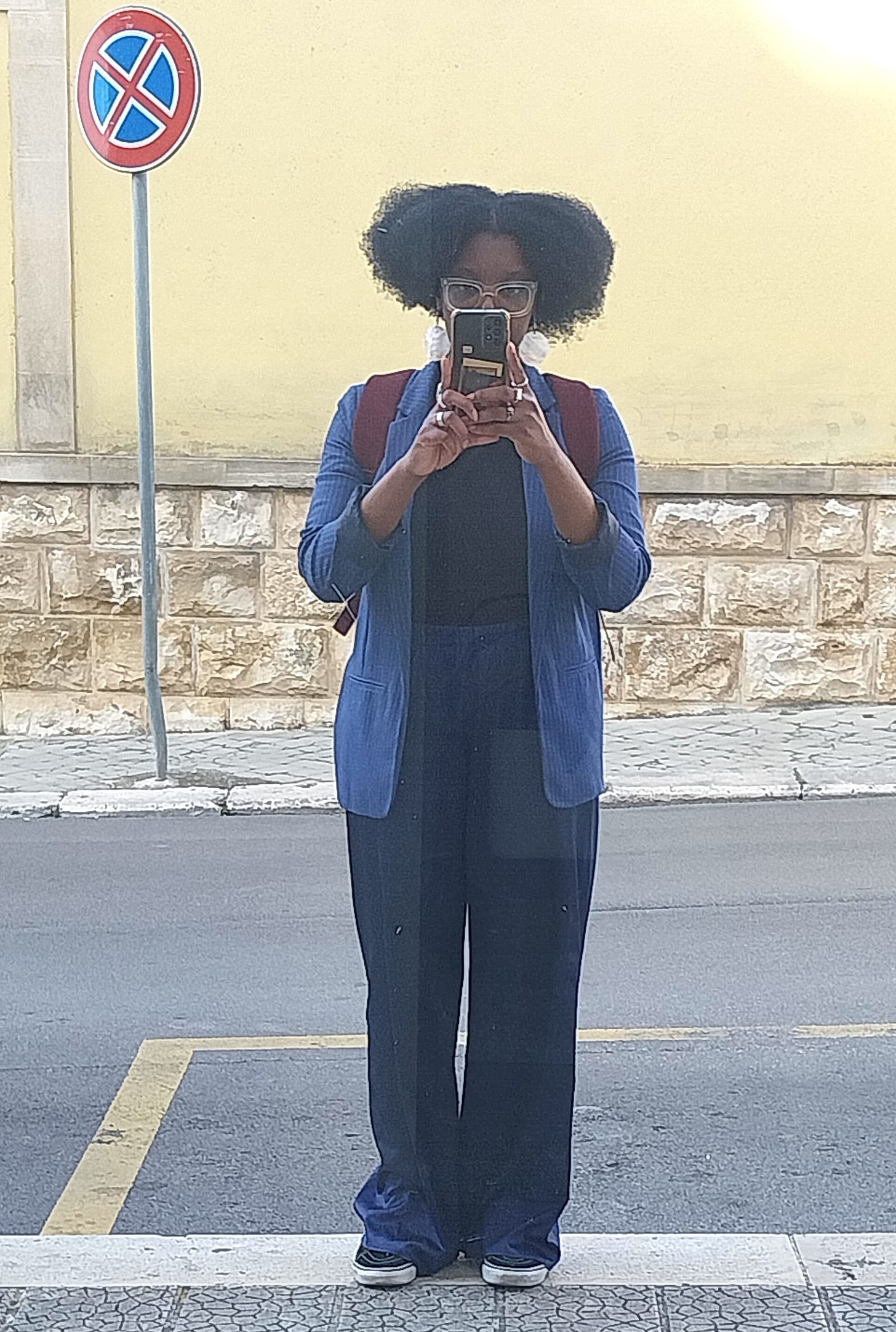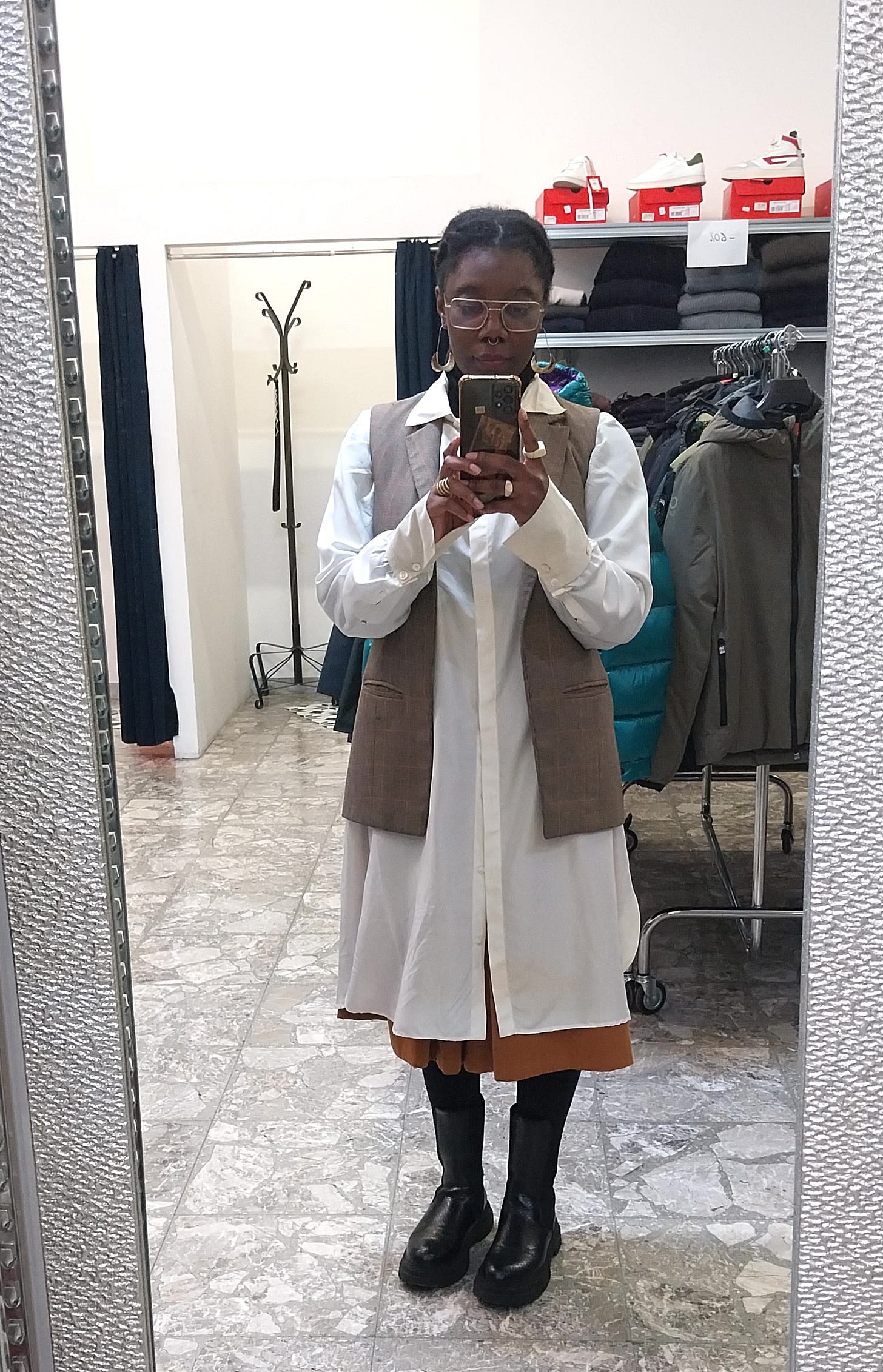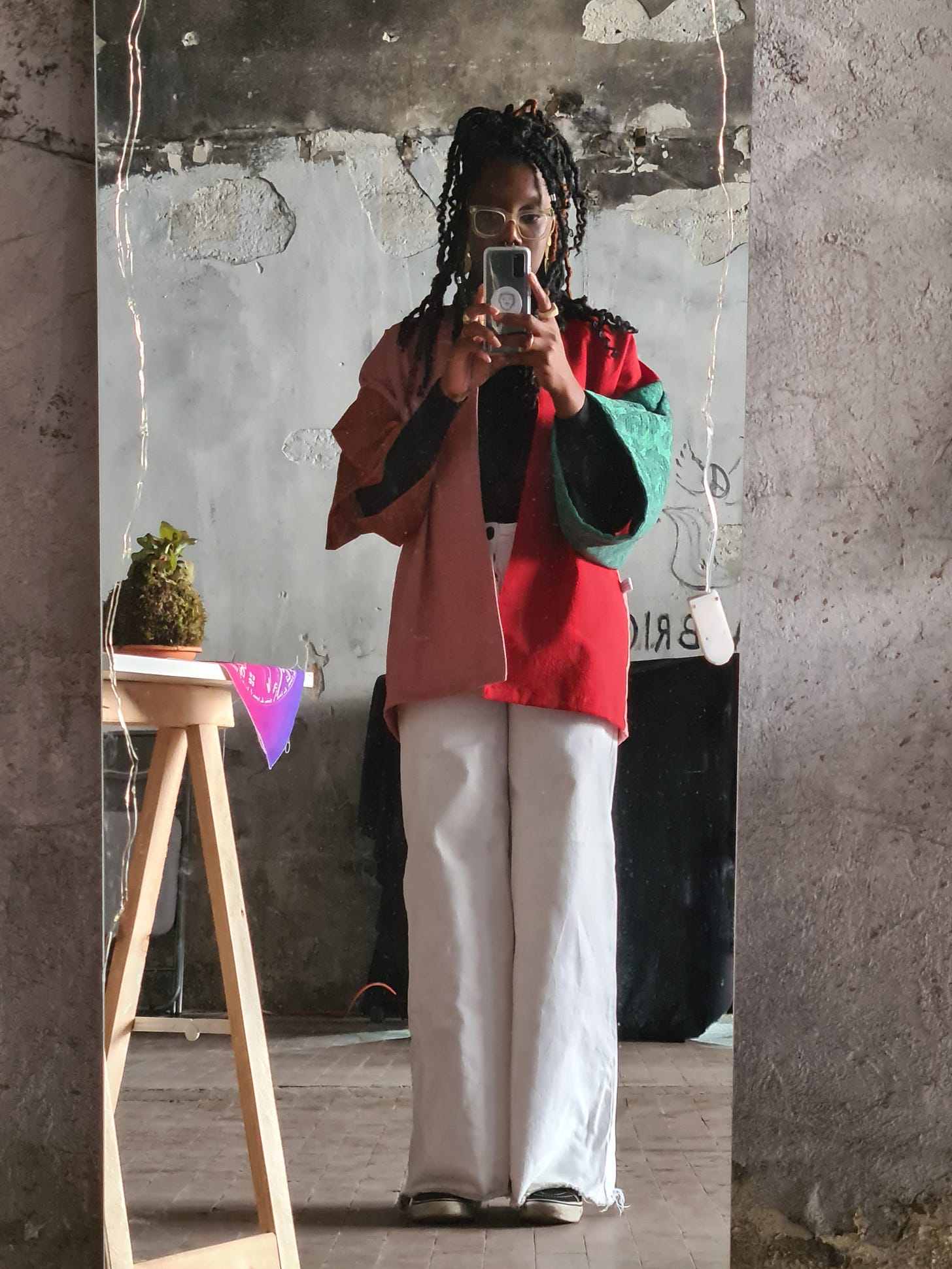style story: emmanuelle maréchal
on being a third culture kid and getting dressed with fibroids
This is style stories, an interview series where I ask guests about their relationship to clothes over the course of their life and how external influences have shaped it. I focus on the ways that they’re able to reject societal expectations on what they should wear. Every guest answers the same questions.
Our guest this time is of Le Journal Curioso. One of the things I love so much about this series, which is as much for me as it is for you, is the vast differences in experiences humans can have with their clothes. From growing up in in Cameroon and France as a third culture kid to living in the UK, Germany, and Italy, Emmanuelle’s is one of the most fascinating style stories I’ve heard.
Please enjoy!
Q: Introduce yourself, your pronouns, your work, and how you spend your time.
A: My name is Emmanuelle Maréchal, and I am a freelancer working in the fashion industry. I do many things, from translation/transcreation to editorial coordination for different fashion companies. I also work as a sales manager for a bridal brand.
I never know what to say when asked how I spend my time because it always changes. Right now, it is a lot of watching K-dramas, teaching myself Korean, and learning more about Apulia, where I live. I would also say that I spend a lot of time researching for my newsletter - it goes from fashion to topics regarding Blackness in Europe/the world - and listening to my body. I can’t believe I am saying this, but it has been almost a decade since I have been suffering from fibroids, and a lot of my time consists of listening to my body and adjusting myself accordingly.
Q: What was your style like when you were a child?
A: That is an interesting question because thinking about it, I spent a lot of my childhood being dressed by my parents, whether I liked it or not. There were periods I didn’t care they dressed me, others where I didn’t enjoy it, and others where I did. So, it definitely shaped my style today. But at times, it felt like I couldn’t express myself through style.
I have a vivid memory of my family and I travelling to Paris to visit Versailles, and me not wanting to take off an outfit I loved, which was a Canadian tuxedo with desert boots, and my mother getting angry at me because I wore it for the whole week we were there.
I was a tomboy as a child because I looked up to my father, even though I wasn’t well aware of how patriarchal our family was. In my child’s mind, my father was cooler than my mother because he was the one driving, making decisions, etc. And I wanted that, so to me it translated to wearing boys’ clothes. I didn’t like girly clothes because they didn’t feel like I could be free and autonomous wearing them. I was a child who enjoyed climbing trees, running, painting, etc. All activities that required being free and I didn’t see I could do that with girls clothes.
Q: Growing up, what messages were you given about what you should or shouldn’t wear (and from whom or where do you think those messages came)?
A: My parents were very strict about what my brother and I should or shouldn't wear. My father comes from a region in the Western part of France, called Vendée. It was and still is a rural area. When my dad was growing up in the 50s, it was very poor. My dad always had a social class complex, especially when he started studying in Bordeaux, which is a very bourgeois city, so dressing well was his way to assimilate into that bourgeoisie. As for my Cameroonian mother, she has always loved dressing, looking feminine, prim and proper. Like my father, clothes were also a means to assimilate, but this time, to that French society that is accepting of you only if you look the way it wants you to look.
For both my parents, clothes embody how respectable someone is, so they always drummed being well-dressed into us.
I also believe that because they were raising a Black and a mixed-race child, they were even more strict about the way we dressed because they didn’t want us to be judged for the colour of our skin. And they weren’t wrong. It was their way to protect us.
I was born in Cameroon and left when I was three, and we came back when I was eight and returned to France when I was twelve. While in Cameroon, I seldom cared about my style and let my parents dress me, it was when we went back to France that I became self-conscious about clothes. I don’t think our parents realised that they didn’t let us express ourselves, which resulted in us being stigmatised: our parents dressed us like little bourgeois who went to private schools, but we were in public schools, so we were mocked.
When I became a teenager, I often changed in our basement before going to school to my mother's dismay. She would yell from the last floor of the building where we lived, “I saw you! You changed your clothes, be sure that when you’re back, you won’t find your beloved rags in the basement.” At the time, they didn’t understand that style was what helped me from being bullied for being Black. People forgot about my Blackness because I dressed cool. Now, we laugh about it in my family, but it was really my survival mode after we returned to France.
Q: How has your style evolved since you were younger and what phases have you gone through with your style (i.e. high school grunge phase, early working days business casual phase, etc)?
A: I went through many phases, but there was always something about Cameroon, whether I was into punk, metal, or ska. It was most of the time jewellery and maybe the way I combined colours that made the difference.
As I grow older, I tend to go back to things I’ve seen my father wear or the prim-and-proper style I so wanted to escape from as a child. I also think living in different countries influenced my style a lot.
Living in Italy, I became obsessed with quality and fabrics. In Germany, where I started working in fashion, it was all about fashion workwear, in which I integrated a lot of menswear elements. I loved wearing monks shoes. This was the time of that blog called Street Etiquette,1 where it was all about exploring how the Black diaspora across the continent dressed, and it inspired me a lot. In the UK, I still wore a lot of menswear-inspired pieces, but I experimented a lot more because London gives you this freedom of dressing the way you want. I also know because I worked in fashion, I was lucky to have fun with clothes.
I’ve recently gone back to working in an office part-time, and I realised that I might be too casual sometimes, so I am trying to find the right balance after working from home for almost five years.
Q: How have external pressures to conform to the ideal standard of beauty and the thought of how others view you affected your style?
A: I think I was more preoccupied by external pressure when I was a teen than I am as an adult. My style is often the reason why people come and talk to me because it is a mixture of all my identities and the places I have called home.
I grew up with no model to turn to and had to find for myself what my standard of beauty was. I refused to have my hair relaxed when I was fifteen, at a time when there was no YouTube or Instagram.
We hear a lot about growing up being Black in the USA, but being Black in France meant not being able to see someone looking like me anywhere in the media. There was no Essence or Ebony magazine in France when I was growing up, so being a young Black girl could feel isolating. I was lucky enough to have a father who paid attention to that and looked for books to style my hair and put make-up on darker skin, but it was a challenge even finding them.
There is no spirit of For Us By Us in France within the Black communities because we are so diverse; we aren’t just Black, we are Africans, Caribbeans, and within these two diasporas, you have a plethora of cultures and styles. I don’t mean it as something negative, but I am just saying it to explain that there is a myriad of ways of being Black in virtue of the country and ethnic group to which our parents belong, so it is extremely difficult to talk about a Black style that could have influenced me.
Rightly because finding myself has been a journey - and still is - I think I couldn't care less about external pressure and validation from others. What affects my style are all the experiences I am living.
Q: How have your sense of style and shopping habits shifted along with changes in your body?
A: So, let me say as a premise that I absolutely hate shopping. I shop online. If I shop in-store, it is because I love the boutique design and how the staff treats the customers. I never loved shopping, simply because of my shopaholic mom.
Luckily because I worked as a product writer at the beginning of my career, I had to measure and try some clothes on to see how they felt, which gave me a great idea of how my body was and what I feel good in or not. But this was until fibroids came into my life.
It’s been eight years since they took out the biggest one - my uterus is covered with very small fibroids, so I constantly need to be checked - and I am now learning about my body every day.
When being bloated is part of your life, you quickly learn to let go of tight clothes; everything that goes beyond a little bit above my belly button is unbearable because it puts pressure on the fibroids. Until I had fibroids, my body was ‘constant’, meaning I gained those kilos in winter and lost them when warmer temperatures arrived. But being and feeling bloated is a different history because my body essentially yo-yo-ing between days where I am super bloated and others where it feels like I’ve lost ten kilos, so dressing has become more challenging. I favour dresses or larger clothes because I can’t stand anything that could potentially put pressure on my lower tummy.
I will definitely need to do some shopping at some point and physically for once, and I already hate the idea.
Q: What barriers do you encounter in trying to express your style? Are there any situations or spaces you feel your style prohibits you from accessing or gives you better access to?
A: I am African, and one accessory that saves me on a lazy hair day while making me feel regal is a good headscarf. Yet, I feel that the rampant Islamophobia prevents women of colour from enjoying wearing headscarves in any situation. In the last years I have been travelling, many times I have been asked to check my “hijab” with more or less respect. In Germany, one woman was asking me to take off my headscarf when her colleague came and indicated to her to let me go through because she understood I wasn’t being treated well. On another instance, during a security check at the airport in Italy, one woman didn’t just put her hand on my headscarf, she actually took it off.
I live in a small town in southern Italy, and I must say that after living in London for years, where I could do any type of braids, now here I have a 3h00 round trip to my hairdresser. It makes me feel I am going back to the 90s-00s. Finding hair products is also an issue because I need to go to the nearest big town, where there is little choice. Lastly, having people stare or stop you every two seconds to tell you “your hair is beautiful” is starting to get dated.
Q: Do you have any style icons? Who are they?
A: As an adult, I wouldn’t say I have any style icons. I think experimenting in my teens and early adulthood helped me understand my style. I am still evolving, especially as my body changes with fibroids, but I am not looking for a style icon to help me dress; I am just looking for clothes that make me feel good.
Q: How would you define your current relationship to clothes and style?
A: I prefer style to fashion because the former is all about who you are. I have learned the hard way to let go of clothes, so now if I lose clothes or I don’t fit in them anymore, I just let go. This said, as my style evolves with me, I love seeing how I wear some dresses or trousers when I first bought them vs. how I wear them now.
Q: What makes your style authentic to who you are today?
A: The fact that I still find all the iterations of myself in some of the outfits I create. For example, I still wear dresses or skirts over large pants like I did in high school. When I do, I love observing how I adapted this style to the person I am today vs. how I did when I was a teen.
Q: Do you wear anything that’s conventionally considered unflattering?
A: I think that’s a question to ask people who know me, because I can’t be objective. I don’t find the clothes I wear at home unflattering, as I choose them for their comfort and style.
Emmanuelle, thank you so much for giving us a window into your experience. Make sure to subscribe to Le Journal Curioso!
Here are style stories from Virginia Sole-Smith, Virgie Tovar, Jessica Defino, Frankie de la Cretaz, Ajiri Aki, Erika Veurink, Amanda Richards, Shana Minei Spence, Jess Kirby, Bri Campos, Shira Gill, Sushmita Šipraga, Emma Eisenberg, and Corinne Fay.
Paid subscribers, read on for a few of Emmanuelle’s clothing recommendations.











